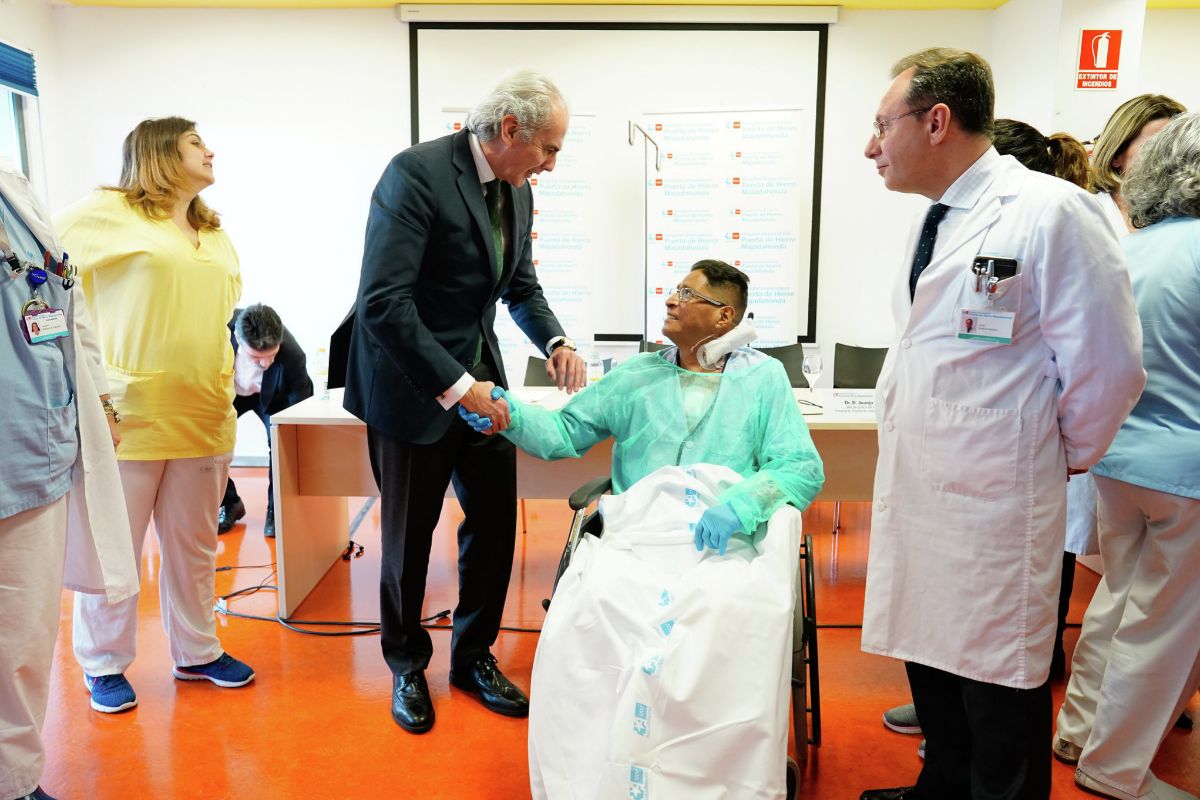- Transplant Cantabria, leader in donations
Jorge W. Pavón lost his father and several of his uncles when he was very young. It was the 70s and none of them knew, but the 'culprit' of those early deaths was a hereditary disease that affected his heart.
The disorder was also written in the DNA of this Madrilenian of Ecuadorian origin. However, Pavón has been able to outwit fate thanks to a pioneer heart transplant.
The intervention, which was carried out at the end of January at the Puerta de Hierro University Hospital in Majadahonda (Madrid), is the first case of heart transplantation from a donor in controlled asystole performed in Spain. And it opens the door to increase the number of organs available for sick people on the waiting list.
Donation in asystole has been practiced successfully for years in organs such as the kidneys or liver. In this case, the donors, instead of having suffered a brain death - usually in most cases of transplantation - have died due to a cardiorespiratory arrest.
Until recently, it was considered that the heart of a deceased person in these circumstances could not be used for transplantation . However, countries such as Australia, Belgium, the United Kingdom or the United States have recently shown that these organs are fit and can save lives.
Spain now joins the list of countries that have performed heart transplants from donors in asystole with a new technique that offers advantages over the conventional procedure.
As Alberto Forteza, head of the Cardiac Surgery service of the Madrid center, explained in a press conference, if in the previous experiences the heart was extracted and, subsequently, it was kept in a perfusion machine before its implantation; In the case of Jorge W. Pavón, the recovery and maintenance maneuvers have been carried out before extraction .
"The heart of the deceased patient is recovered before extraction, thanks to an extracorporeal circulation machine [called ECMO] that infuses oxygenated blood to the patient and keeps the organ functioning," Forteza said.
This procedure, added Juanjo Rubio, responsible for the Intensive Care Unit of the hospital, offers different advantages over other techniques. "The evaluation of the functioning of the heart is done under physiological conditions, the proper functioning of the organ can be better confirmed."
Jorge W. Pavón, who must still remain in the hospital for two to three weeks for his full recovery, is "well" and is looking forward to recovering his life. "Above all I want to be able to go to Barcelona to see my granddaughters," said this former transport worker who was on the waiting list for about five months.
"When they told me about the operation, I went without fear, I had no doubts, because it was very bad, I spent more time inside the hospital than it was, " he explained.
After congratulating the multidisciplinary team that carried out the intervention and thanking their generosity for the donor's family, the director of the National Transplant Organization (ONT), Beatriz Domínguez-Gil, wanted to underline that "this transplant opens a new path for the availability of hearts to transplant . "
Specifically, Dominguez-Gil said that the possibility of donating hearts in controlled asystole would increase the number of suitable organs "between 5% and 10% . "
According to ONT data, in 2019 300 heart transplants were performed in Spain. In 50% of cases, Domínguez-Gil added, "the transplant was performed in less than three months." Even so, there are currently 149 people awaiting a heart to live, 20 of them children.
Getting a donated heart after death from cardiorespiratory arrest is suitable for transplantation is very complex, said those responsible for the intervention. The heart is especially sensitive to ischemia, to the lack of blood supply, so it is necessary to exercise precision and coordination to act as quickly as possible.
"In any donation, it should not take more than 25 minutes to establish the infusion so as not to lose the organs," Forteza explained. However, in this specific case, "the heart spent less than five minutes stopped thanks to coordination and previous training," added Javier Segovia, head of the Cardiology department of the Madrid hospital.
Marina Pérez, hospital transplant coordinator, wanted to highlight the importance of coordinating a team in which surgeons, cardiologists, anesthetists, intensivists, neurologists, nurses, assistants and other health professionals participated and thanked the family's kindness, thanks to which a liver, kidneys and tissues were also transplanted to other patients.
The donation in asystole has grown widely in Spain in recent years. As Domínguez-Gil explained, currently 32% of donors do so in circumstances of asystole. And everything indicates that the figures will continue to grow.
In addition to the Puerta de Hierro Hospital in Majadahonda (Madrid), the Bellvitge Hospital of Catalonia has also received authorization to perform heart transplants from a donor in controlled asystole by the Permanent Transplant Commission of the Interterritorial Council of the National Health System (SNS)
From his room in the hospital, Jorge W. Pavón counts the hours to return home and leave behind a life in which he "could not walk" and was constantly suffocating.
According to the criteria of The Trust Project
Know more- Science and Health

